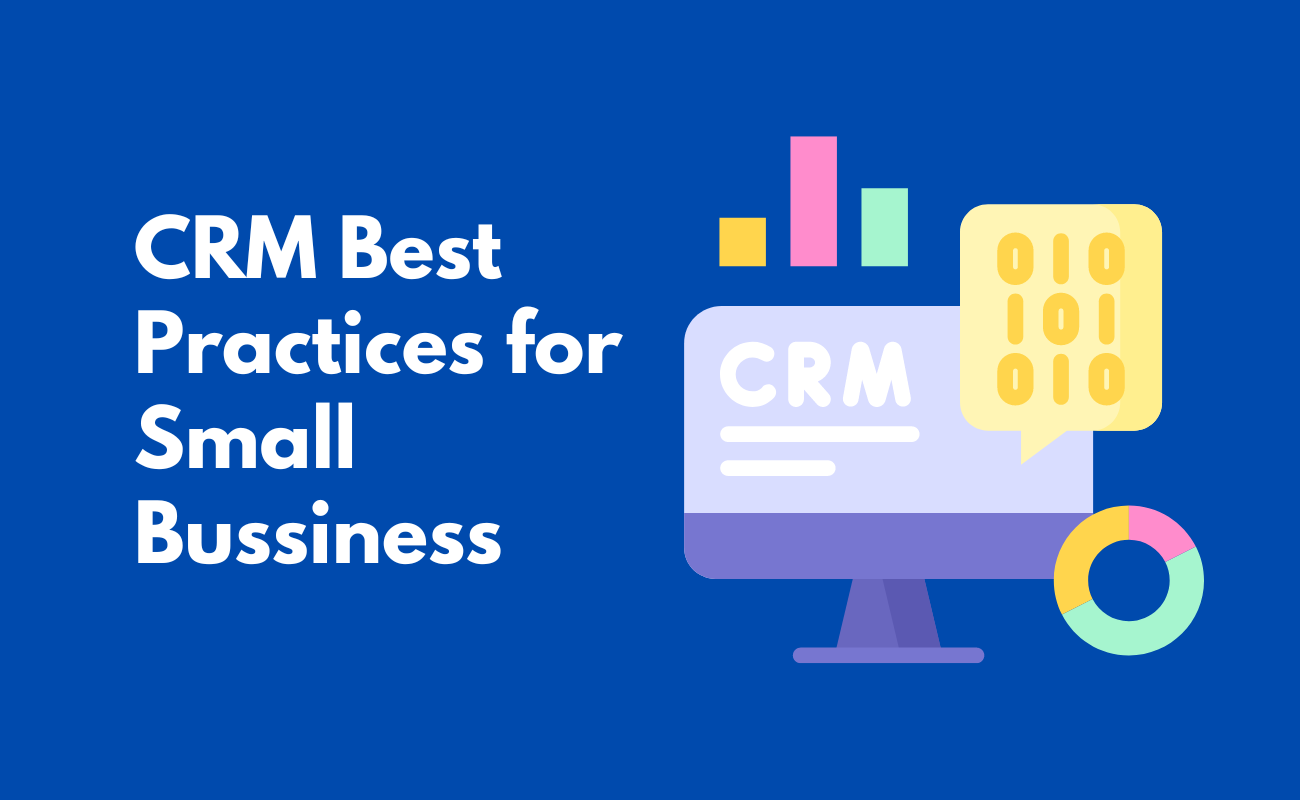As a business owner, the relationship you have with your customers will play a huge role in influencing your sales and customer retention. Gone are the days when your only worry was to convince a customer to buy your solution. This was half the battle in this competitive marketplace. Over the last few years, it’s important to ensure you cultivate and nurture your relationship with your customers to improve your competitive advantage and customer retention.
For this reason, there was a need to introduce a system to help you manage your relationship with customers. CRM has become a sought-after solution over the last few years, helping businesses maintain a good relationship with their customers. You might think a CRM is only needed for larger enterprises such as car dealerships. However, you’d be surprised to realize how many customers need guidance even before making small purchases. Thus, choosing the ideal CRM solution for your small business is important to improving your competitive advantage.
This post discusses what you need to know about CRM. You’ll learn what CRM is, the best practices that can help get excellent results from your CRM implementation, and more. Let’s get started.
What Is CRM?
Customer relationship management (CRM) refers to the tools, systems, and strategies that help businesses track all communications and nurture relationships with their clients and prospects. CRM will also study your process and staffing requirements to ensure you can develop a productive and long-lasting relationship with your clients.
In the past, business owners utilized spreadsheets and other records to nurture customer relationships. Thus, important data was spread across multiple systems and people, making it hard for you to utilize the available data to improve your customer relationships and sales. Also, these practices were hard to update, interpret, and lost easily, leading to inconsistent communication between customers and your team members.
On the other hand, a CRM will organize your data in an easy-to-access location. Thus, it’ll be easier for your team members to leverage the centralized data and collaborate with other departments, improving your production line.

What Are The CRM Best Practices?
CRM practices refer to strategies a business owner needs to adopt and utilize when implementing and using a CRM tool for maximum utilization. Investing in a CRM tool is one thing, but understanding its effective usage and integration will play a huge role in improving your return on investment (ROI). Some of the CRM best practices include:
1. Choosing A CRM That Suits Your Needs
While this might seem like a ‘duh’ moment, you’ll be surprised to find out how many business owners choose the wrong CRM tool for their business operations. Understanding your needs will play a huge role when choosing a CRM for your small business operations, leading to improved sales and customer relationships.
There are many specialized CRM’s on the market, e.g. if you’re running a Dance Studio you might look for a Dance Studio software for small business to manage your clients in stead of a generic one as it fits your needs much better.
You might consider the following factors to ensure you choose a CRM that suits your needs. They include:
Integration with other tools: Any business has many systems that must work together to meet your business goals and expectations. For this reason, it’s important to ensure you choose a CRM strategy that can be easily integrated with your current tools, improving your productivity. If the CRM doesn’t integrate with your current systems, you might be forced to incur extra charges of purchasing new system(s), lowering your profit margin.
Scalability: It’s the goal of most businesses to increase size and production in the near future. Thus, when choosing your CRM, ensures it accounts for your future business needs, such as expanding customer reach. Hence, meeting and nurturing future customer relationships will be easier without returning to square one of CRM implementation.
For this reason, it’s important to conduct extensive research to understand your current and future customer relationship needs, ensuring you choose the ideal CRM system for your operations. You can entitle a qualified team to research to ensure you have enough time to manage core business goals and create accountability, ensuring the work gets done.
2. CRM Training And Support
This is another practice you should consider to ensure maximum utilization of the CRM implementation. Technological advancement has played a huge role in revolutionizing how businesses interact and engage with customers. However, some individuals still cannot utilize advancements such as CRM to cultivate and nurture sustainable and productive relationships with customers. Implementing a system with no proper training programs may force some of your workforce to stick to traditional methods, reducing the value of your investment.
Providing training programs will ensure your team members are equipped with the necessary know-how and skills, guaranteeing they utilize the CRM system. There are several ways you can offer training. Your service provider may include training programs when implementing the CRM system into your business operations. The training can be offered free of charge or at a fee. For this reason, it’s important to ensure you conduct enough background checks to avoid paying more money in the long run. On the other hand, the business owner can reach out to third-party vendors to offer training to the team members.
The major benefit of service provider programs is that there will be reliable training in place when a new hire joins your team. Thus, you’ll be saved from incurring extra costs of hiring third-party trainers when you hire a new team member, improving your profit margin.
3. Automation
Automating your CRM system will play a huge role in reducing errors and mistakes associated with human practices. This will increase your data mining and management efficiency, leading to improved customer relationships. However, it’s important to understand the initial costs of automating your CRM may leave a huge dent into your saving margin, but it may save many bucks in the long run.
For this reason, it’s important to conduct extensive research to identify repetitive processes in your production line. This will make employing the ideal automation solutions easier, reducing risks and speeding up your business processes.
4. Prepare A CRM Implementation Budget
CRM implementation budgets are highly variable, and understanding how much you’re likely to spend is one of the CRM best practices. The budget will vary from one business to another, depending on the company size, the type of CRM, the scope of your CRM project, and more. Understanding these factors will make it easier to develop a suitable budget for CRM implementation, ensuring you have enough bucks to finish the project. Also, you’ll avoid unpleasant surprises, improving the efficiency of your CRM implementation. Some of the costs you should account for include CRM training fees, data migration, backup and storage, project management charges, and more.
What Are The Benefits Of CRM?
Here are the benefits of a CRM strategy:
1. Improved Customer Service
The CRM will gather important customer information such as purchase history and demographics and manage the data in a centralized repository. Thus, it’ll be easier for your team members to access this information, improving their customer understanding. Hence, they provide services that meet the customer’s needs and expectations, improving sales and customer satisfaction.
2. Increased Sales
This is another benefit of CRM. If the customers are satisfied, they will keep coming back, improving your sales. Also, they might recommend your business to their friends, acquittance, and more, leading to improved sales and revenue.
It also helps streamline and automate your sales processes, improving the efficiency of your sales pipeline. Thus, it’ll be easier to analyze your sales data and store it in one centralized location, which can be accessed by anyone who needs it. Accessing your sales data will simplify the process of developing an efficient step-by-step sales process.
3. Identify And Convert More Leads
As a business owner, you may use social media to capture the attention of your target audience. Sometimes, you might even do it the old-fashioned way of setting up a booth at a trade show to try to rope clients in. But once you have their attention, then what? How can you even confirm you have their attention? Implementing a CRM will make it easier to gain these insights and optimize your lead generation funnel.
The system will capture and record all of your interactions with the target audience, regardless of the method you’re trying to rope them in. Thus, it’ll be easier to qualify leads based on user activity, such as the use of keywords, and integrate that data into your marketing campaigns to convert more leads.
What Are The Challenges In CRM?
The following are challenges you might encounter when implementing a CRM system. They include:
1. Costly And Time-Consuming
Implementing and integrating a CRM system may take a considerable amount of time and money. This will affect your production line and may leave a huge dent in your savings.
You can avoid this challenge by purchasing a reputable off-the-shelf system instead of building your CRM from scratch. Also, when choosing a solution, ensure it’s scalable and flexible to meet your future needs, reducing the need to purchase a new system in the near future.
2. Data Security Issues
Implementing a CRM may expose your sensitive data to ever-improving cyber threats. Any cyber threats may compromise your competitive advantage and your public image, leading to lower sales and cash flow.
You can mitigate this challenge by ensuring you choose the right CRM system. Conduct extensive research to understand the security architecture of your CRM to ensure your data is safe. Some of the security measures include implementing cloud computing, encryption, iOS VPN, and more.
Bottom Line
As discussed above, CRM will play a huge role in improving your competitive advantage. However, with no proper usage and implementation, you may end up losing your whole investment. Conduct extensive research to identify the ideal practices to ensure CRM maximum utilization.








Leave a Reply